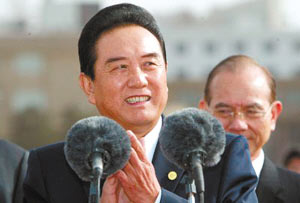神秘内容 Loading...
 (来源:www.EnglishCN.com) (来源:www.EnglishCN.com)
Taiwan trade deal eases tension
China and Taiwan yesterday liberalised trade and travel links in a big move towards ending decades of hostility between the Communist regime in Beijing and the self-governing island state.
Chen Yunlin, the mainland's top cross-Strait negotiator, signed four agreements with his counterpart Chiang Ping-kung in Taipei during the first high-level negotiations between the two sides to take place in Taiwan.
The talks mark a warming of relationships between the two governments, which have faced each other in an armed stand-off across the Taiwan Strait since the Communists triumphed in a civil war in 1949.
But the talks took place amid protests from some Taiwanese, who are worried the island's Kuomintang party government is making concessions while China retains an aggressive military stance.
The People's Republic of China claims sovereignty over democratic Taiwan and backs its claim with the threat of military force if Taipei ever declares formal independence.
Mr Chen and Mr Chiang, who represent quasi- governmental bodies responsible for cross-Strait exchanges, agreed to triple the number of direct charter flights from 36 a week to 108, and to expand service to 16 more cities in China.
They also agreed to open up further air and sea cargo routes, deepen postal links and co-operate on food safety issues.
“After 30 years of waiting, for people on both sides of the Strait, the prospect of direct flights and direct mail will now become reality,” Mr Chen said.
Yesterday's deal follows talks in June, which allowed mainland Chinese tourists to visit Taiwan and established weekend direct flights. But the plan proved unpopular with mainland tourists, and has been used by the opposition Democratic Progressive party as a symbol of the failure of Kuomintang president Ma Ying-jeou's cross-Strait policies.
In an open letter, Tsai Ing-wen, who chairs the DPP, questioned the government's reliance on China. “There have been very limited benefits with the focus of all of our economic attention and resources on China.”
中国大陆与台湾昨日放开了两岸之间的贸易和旅游联系,朝着结束北京共产党政权和自治的台北之间的数十年敌意迈出了一大步。
双方首次在台湾举行高层会谈,大陆海协会会长陈云林与台湾海基会董事长江丙坤在台北签署了四项协议。
这些会谈标志着两岸政府之间关系出现回暖。自1949年共产党取得内战胜利以来,双方一直处于隔海对峙状态。
不过,会谈是在一些台湾人的抗议声中举行的,他们担心,在中国大陆维持进攻性军事姿态之际,岛内国民党政府正做出让步。
中华人民共和国宣称其对民主政体的台湾拥有主权,并威胁,如果台湾一旦宣布正式独立,将付诸武力来行使自己的主张。
陈云林与江丙坤代表负责两岸交流的准政府机构。双方同意,将两岸对飞航班数增加两倍,从每周36班次增至108班次,中国大陆还增列16个航点城市。
双方还同意进一步开放空中和海上货运航路,加深邮政合作,并就食品安全问题进行合作。
陈云林表示:“两岸同胞渴望了30年之久的通航、通邮将变为现实。”
6月份的会谈中,双方达成协议,允许中国大陆居民赴台旅游,并开通了周末直飞航班。不过,该计划并未引发中国大陆游客踊跃赴台观光,被反对党民进党(DPP)当作国民党籍总统马英九两岸政策失败的标志。
在一封公开信中,民进党主席蔡英文质疑马英九政府对中国大陆的依赖。“现阶段把经济发展押宝在中国的这条路线,不但效果有限而且有高风险。” |
| |
|
|
|
|
|
|

